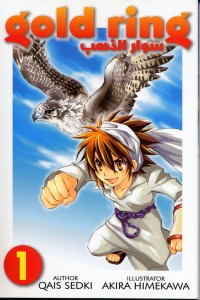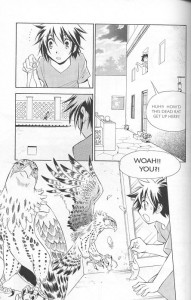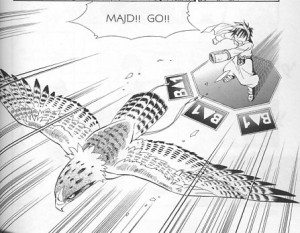 Qais Sedki knew that manga was popular in the United Arab Emirates (UAE) and felt that it was time for a good manga story with heroes Arab children could turn to for inspiration. Manga, especially kids’ manga, is chock full of good, old-fashioned stories, full of guts and hard work and inspiration and heart. So, Sedki decided to create an original Arabic-language manga, and bring it to the UAE. That manga is Gold Ring.
Qais Sedki knew that manga was popular in the United Arab Emirates (UAE) and felt that it was time for a good manga story with heroes Arab children could turn to for inspiration. Manga, especially kids’ manga, is chock full of good, old-fashioned stories, full of guts and hard work and inspiration and heart. So, Sedki decided to create an original Arabic-language manga, and bring it to the UAE. That manga is Gold Ring.
In order to give the manga a genuine “manga” feel, Sedki worked with an experienced team of artists, who draw under the name Akira Himekawa, to illustrate and produce the manga. Jason Thompson and Mikikazu Komatsu did an interview with Himekawa last year when the book debuted in the UAE. Himekawa are probably best known in America for their work on The Legend of Zelda manga.
I was very pleased (with many thanks to Mikikazu Komatsu and Akira Himekawa!) to be the recipient of the first volume of Gold Ring. Even in Arabic, it was instantly apparent that this was a manga that any young fan would find approachable and entertaining. It follows young Sultan, a boy who lives in a small town with his mother and his dream to win the Gold Ring, a falconry tournament. For American readers, this is probably about the same level of exotic as a Pokemon contest. The book is indeed not dissimilar to Pokemon, with many of the same conventions in storytelling.
Sultan is instantly likable in a typical kid sort of way. He’s caught trying to sneak in to the Gold Ring arena with a friend, but they escape on his 4-wheeler. When his friend catches a falcon to sell, Sultan gives away his quad in order to save the falcon and let her go free. (Quality 1 of all the best shounen manga heros – they must have a kind heart.) In what is an absolutely adorable scene, the falcon returns his kindness by bringing Sultan a dead rat. Sultan and Majd (as the falcon is now known,) become friends and Sultan starts to tentatively train her. (Quality 2 of the best shounen manga hero – he and his sidekick are not master/slave, but friends.)
Sultan is introduced to a Bedouin who is a master at falconry, but dislikes the Gold Ring competition, as it devalues the art of falconry. But, because Sultan is a dear friend’s son, and because Majd and Sultan have a visible bond of love, he will – of course – teach him. Sultan has some natural skill and Majd is exceptionally intelligent, so they master basics quickly and are ready for the Gold Ring Trials in time. (Quality 3 of the best of shounen heroes – he must have some natural affinity for the skills he needs, but must have them honed through competition with stronger opponents.)
Anyone who has ever read any popular shounen manga knows what will come next. Sultan isn’t truly prepared, but he and Majd reach down into their hearts and find the strength and skill to succeed and make it into the Gold Ring competition! And, they are told, that they did it the old-fashioned way, with hand signals and hearts and mind as one, rather than using that bane of good old guts…technology.
And so we await volume 2, to see how Sultan and Majd do against their stronger opponents in the tournament. Already, we don’t like the reigning champion and can’t wait for him to be defeated. What will follow is undoubtedly a typical boys’ manga series as Sultan and Majd face enemies and turn them into allies with their combined powers of friendship and heart.
As I said, even in Arabic, the natural charm of this manga was instantly apparent to me. Now I’ve had the pleasure of reading it in English, and soon, so will you. According to Qais Sedki on Twitter, the English-language edition will be available for pre-order on January 26, 2012.
If you’re looking for something deep, dark, an expose’ on Arab religion or political conflict, you won’t find it here. In Gold Ring, people are happy, quests are personal, accountability is individual. This is a child’s world, an ideal world. The Bedouin is master of his world, there are no hardships or want. War has no place here. We don’t learn much about Sultan’s mother. Is the death of her husband a hardship? Is she being pressured by family members or money issues? We don’t know, only that to Sultan, she seems a happy person and a good mother. (I’m inclined to believe this since, in shounen manga, having only one parent is par for the course, but that parent is always positive and supportive – even when the child is unaware of this.) Sultan has several stand-ins acting as positive male role models for his late father, Suroor, the Bedouin, Hassan, the Gold Ring staffer and his Uncle, all of whom encourage him in his dreams.
So, while you will find an idealistic portrayal of life, what you will also find here is a tremendous example of the best qualities of a shounen manga translated with skill and love into a likable kids’ book, whether that child lives in Middle America or the UAE.
When I was first given the Arabic edition, I was asked whether I thought it would sell in America. Clearly, there are some people who will not like it on principle. Common phrases, such as Inshallah, are left whole in the text, even in the English translation. It’s sadly not hard to imagine that causing some sort of pointless kerfuffle during a reelection year for a mayor or freeholder of somewhere. But, as a story told for children, about a child and his animal best friend, with the shounen manga sensibility first and foremost, I said then, and still feel now, that it has a solid chance here in the US market. The translation is good, there’s no sense of awkwardness in the sentences. There is a short glossary of falconry terms in the back and in-margin translations of common Arabic phrases. If there was a single thing to complain about, it would be the font used. The Arabic fonts were more natural – and more artistic – where the English font is blocky and quite dull, with no emphasis or artistic flourishes.
For typically shounen-manga style idealism, and a genuine and approachable look at manga through UAE eyes, I recommend Gold Ring. After all, who wouldn’t love a story about a Boy and his Falcon?



